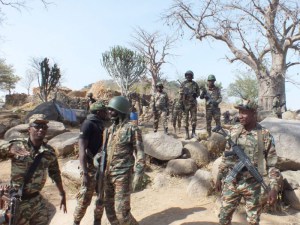The Vice Chancellor of the University of Maiduguri, Abubakar Njodi, has debunked claims by the Nigerian military that it had rescued oil workers that were recently ambushed and captured by Boko Haram fighters.
Njodi said on Friday that claims made last Wednesday by the spokesperson of the Nigeria Army, Sani Usman, who had told the media that soldiers had rescued the kidnapped officials.
The VC had earlier said the institution had been engaged in providing consultancy services to the NNPC in the Lake Chad region.
The crew of geologists and their aides were from the university and were subcontracted by the Nigerian National Petroleum Corporation, NNPC.
The vice chancellor whose brother was among those killed,spoke during a condolence visit paid on him by officials of the federal ministry of petroleum.
He said that he was at a loos why the Nigeria Army chose to mislead the world with the spurious claims.
“The military said it has rescued all the geologists working for NNPC. I wonder how can the recovery of corpses be referred to as being rescued,” he said.
Mr. Njodi said his staff were out in the danger zone carrying out the oil exploration services after the security operatives had assured them of their safety.
“We are all at liberty to guess now as to whether security was provided or not,” he said.
“We have lost four vibrant members of our academic staff in that incident. None of the affected lecturers put in less than ten years in the university. For me to get a replacement for them would be difficult. We are talking of a department that has about 12 to 13 members of academic staff. Four of them are no more.”
The Minister of Petroleum, Ibe Kachikwu, had on Thursday also said the exploration only continued after security assurances by the military.
Mr. Kachikwu also announced a halt to oil exploration in the Lake Chad Basin until the military assures of better security in the area.
The leader of the visiting delegation to the vice chancellor, Saidu Muhammed, who is the Chief Operation Officer of Gas and Petroleum services of the petroleum ministry, had earlier delivered a condolence letter on behalf of the minister of petroleum to the vice chancellor.
He said the ministry would continue to strengthen its partnership with the university despite the “hiccups” that happened this week.
Earlier, during a similar courtesy visit by the Minister of Education, Adamu Adamu, Mr. Njodi confirmed to journalists that the deceased were two geologists, two technologists and a driver from the institution.
Mr. Njodi added that four other staff were still missing: two lecturers, one technologist and a driver.
He explained to the education minister why the university had entered into a partnership with the NNPC.
“In our commitment to contribute to the country’s economic development, we defied the odds and joined the operation. Initially, we reluctantly accepted to go back and joined the operation, but we were assured of adequate security.
“The deceased (victims of the insurgency) should be immortalised, they deserve the national honour,’’ he added.
Boko Haram gunmen had on Tuesday attacked a crew of geological scientists from the University of Maiduguri who were assisting the NNPC in carrying out surveys in the Lake Chad region where the federal government believes there are chances of getting new deposits of crude.
The military had said it lost 9 soldiers and that the missing NNPC officials were rescued.
But Premium Times reports that even the military casualty is believed to be higher as about 18 corpses of soldiers who lost their lives in the bloody rescue mission were said by hospital officials to have been brought into morgues in Maiduguri alongside about 30 other civilians casualties. The total unofficial death toll is believed to be 48.
The attack came few days after the Nigeria Chief of Army Staff, Tukur Buratai, issued a 40-day ultimatum for the commanders of the counterinsurgency operation to secure the arrest of the Boko Haram leader ‘dead or alive.’
A rattled President Yemi Osinbajo on Thursday night directed that all the service chiefs relocate to Maiduguri to personally supervise the counterinsurgency operation.














